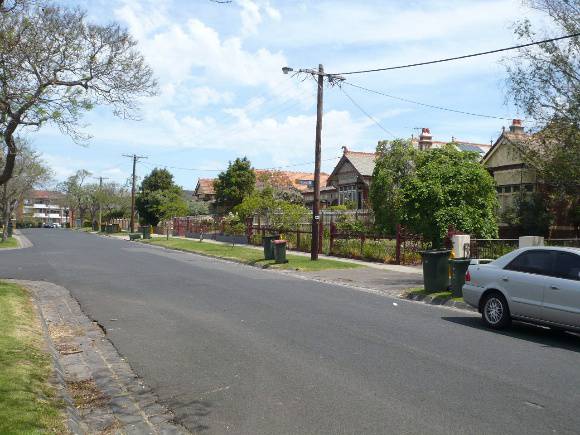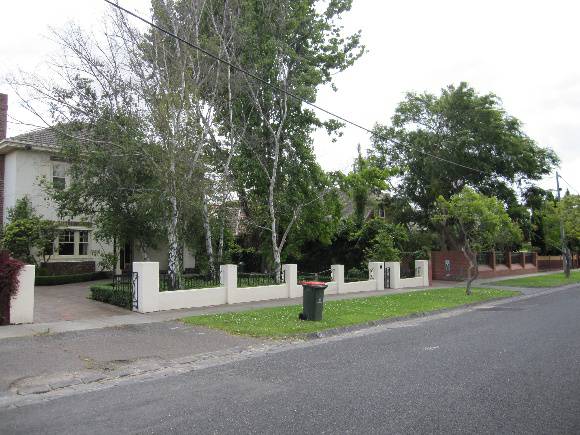| Back to search results » | Back to search page » |
|
Peterleigh Grove and Kalimna St
Other NamePrecinct Location2-26 & 7-29 Ardoch St and 2-10 & 34 Brewster St and 1-9 & 4-10 Curtis St and 1-31 & 2a-4, 28-30 Kalimna St and 1-9 & 2-12 Kiora St and 64-90 Napier Cr and 253-285 Pascoe Vale Rd and 1-41 & 2-42 Peterleigh Gr ESSENDON, MOONEE VALLEY CITY LevelIncluded in Heritage Overlay |
|
Statement of Significance
What is significant? 1. The
houses and any associated early or original front fences, as
appropriate, at: Key attributes that contribute to the significance of this precinct include: - the consistency of scale (one or two storey), form, siting (uniform
or similar front and side setbacks), and original materials and
detailing (weatherboard face brick or render with iron or tiled hip or
gable roof, verandah/porches with cast iron or timber detailing) of
the contributory houses Other houses in the precinct, post-WWII fences, and non-original
alterations or additions to contributory places are not significant.
How is it significant?
Why is it significant? The early twentieth century residential areas are historically
significant as an illustration of the 'garden suburb' estates
comprising detached housing on garden allotments that characterised
residential subdivisions in the early to mid-twentieth century.
(Criterion D) Peterleigh Grove is architecturally and aesthetically significant as
a fine example of a mid-twentieth century residential area, which is
notable for the consistent quality of its built form and the very high
degree of integrity to its period of development. (Criterion E) Kalimna Street is architecturally and aesthetically significant for
the particularly fine cluster of Edwardian and Queen Anne Revival
houses. The consistent quality of its built form and the very high
degree of integrity to its period of development is notable.
(Criterion E) Pascoe Vale Road is architecturally and aesthetically significant as
a fine collection of large middle class Edwardian villas and Inter-war
bungalows. The consistent quality of its built form and the very high
degree of integrity to its period of development is notable.
(Criterion E)
The Peterleigh Grove and Kalimna Street precinct in Essendon is
aresidential area comprising houses from c.1880 to c.1945. The
housingincludes Victorian and Edwardian cottages and villas, Queen Anne
Revivalvillas, and inter-war houses and bungalows. The following
elementscontribute to the significance of the precinct:
- 7, 13-29, 2-8, & 12-28, 32-34 Ardoch
Street
- 1-17, 2-16, 20, 26-30 & 34 Brewster Street
- 3-9
& 4-10 Curtis Street
- 3, 7-19, 23-31, 2, 28 & 30 Kalimna
Street
- 1, 1A, 3, 5, 7, 2-6, 10, & 12 Kiora Street
- 64-78
& 82-90 Napier Crescent
- 253-285 Pascoe Vale Road (excluding
255A)
- 1-41 & 2-42 Peterleigh Grove
- Peterleigh Grove is notable as an almost
completely intact late 1930s estate where many houses also retain
original or early front fences. The intact groups of Edwardian era
housing in Kalimna Street and the large Edwardian villas and inter-war
bungalows along Pascoe Vale Road are also notable.
- the high
degree of intactness to the late nineteenth century and early
twentieth century development dates
- contributory buildings that
typically survive with their presentation to the street being largely
unaltered
- original front fences and low height of fences meaning
that dwellings are visible from the street
- road alignments and
allotment patterns resulting from the nineteenth century
subdivision
- the absence of vehicle accommodation in front setback
areas
- the wide median strip and mature Canary Island Palms
(Phoenix canariensis) in Brewster Street.
- the bluestone
kerb and channel in various streets throughout the precinct, and the
unmade rear laneways to some properties.
The Peterleigh Grove and Kalimna Street precinct in Essendon is of
local historic, architectural and aesthetic significance to the City
of Moonee Valley.
The precinct as a whole is historically significant as a
representative example of a residential area, which demonstrates key
phases of development in Essendon. The nineteenth century houses are a
reminder of the substantial villas and mansions built during the 1880s
boom, while the later development provides a tangible illustration of
how the development of improved transport networks in the twentieth
century led to closer settlement, which included subdivision of
nineteenth century mansion estates. The consistency of built form in
each main period and the extent to which phase is clearly apparent
provides a vivid illustration of this pattern of development.
(Criteria A & D)
Group
Residential buildings (private)
Category
Residential Precinct





